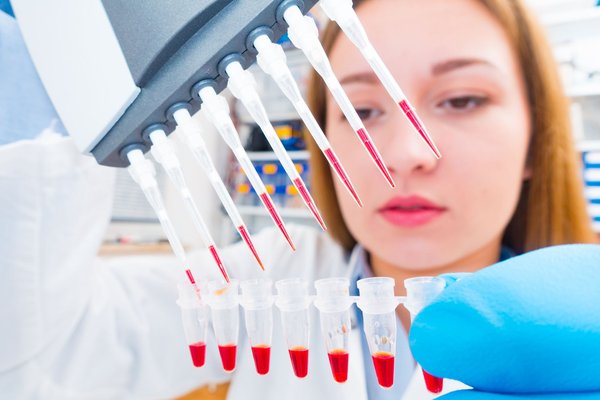Despite significant progress, cancer continues to be the second-leading cause of death in the U.S. More than 2 million new cases of cancer are likely to be diagnosed in the U.S. this year. More than 600,000 deaths are expected from cancer in 2024.
There's also a huge financial cost that's growing rapidly. In 2020, treating cancer in the U.S. cost roughly $200 billion. By 2030, the total is projected to increase to more than $245 billion.
But with every problem comes an opportunity -- in this case, a massive opportunity to put your dollars to work to help the large and small companies that are developing new ways of diagnosing and treating cancer. Here's what you need to know about some of the leading cancer-focused healthcare stocks that investors should consider.

Top cancer stocks
Top cancer stocks
Cancer stocks include drugmakers that focus on developing cancer therapies and companies that develop products used in screening for cancer. Some of these stocks are highly volatile, such as early-stage biotech stocks. Others, though, are more established and less risky. Here are four top cancer stocks to consider that include both small and large companies:
| Company | Market Capitalization | Key Areas of Focus |
|---|---|---|
| Guardant Health (NASDAQ:GH) | $2.5 billion | Liquid biopsy |
| Illumina (NASDAQ:ILMN) | $22.9 billion | Genomic sequencing, liquid biopsy |
| Pfizer (NYSE:PFE) | $166.2 billion | Oncology, immunology, cardiovascular diseases, rare diseases, vaccines |
| Summit Therapeutics (NASDAQ:SMMT) | $13.7 billion | Oncology |
1. Guardant Health
1. Guardant Health
Guardant Health (GH 6.28%) stands out as a pioneer in liquid biopsy, a blood test that detects tiny amounts of DNA that have broken away from tumor cells.
The company first achieved success with its Guardant360 product, a liquid biopsy used to help determine the appropriate therapy for cancer patients. The Guardant360 CDx product is the first liquid biopsy approved by the U.S. Food and Drug Administration (FDA) for all advanced solid tumors. It's also used as a companion diagnostic to identify patients with non-small cell lung cancer (NSCLC) who could potentially benefit from treatment with AstraZeneca's (AZN 0.89%) Tagrisso, Johnson & Johnson's (JNJ -0.37%) Rybrevant, or Amgen's (AMGN -1.01%) Lumakras.
Guardant Health also offers a tissue biopsy product, Guardant360 TissueNext, designed to be ordered with the Guardant360 CDx test. Its Guardant360 Response test helps doctors determine if a cancer therapy is working with patients. In addition, Guardant Health markets Guardant Reveal, the first blood-only test that can detect residual and recurrent cancer in less than two weeks without requiring a tissue biopsy.
The company's total addressable market in cancer treatment selection and recurrence monitoring is about $30 billion per year. However, Guardant Health has a much larger market opportunity of $50 billion annually in the U.S. alone for early-stage cancer detection.
Guardant Health won U.S. Food and Drug Administration (FDA) approval for its Shield blood test for screening colorectal cancer in July 2024. The company hopes to expand Shield to include lung cancer as the next step in its goal to have a multicancer early-stage test.
2. Illumina
2. Illumina
Gene-sequencing giant Illumina (ILMN 1.94%) is also a major competitor in the cancer therapy selection market. Its TruSight companion diagnostic tests are used by several biopharmaceutical companies, including Bristol Myers Squibb (BMY 0.19%) and Merck (MRK 0.58%).
Illumina spun off Grail (GRAL 1.13%), which develops liquid biopsy products, in June 2024. However, the company still owns a 14.5% stake in Grail.
Arguably the greatest value provided by Illumina in the fight against cancer is the use of its gene-sequencing systems by researchers around the world. More than 21,600 Illumina systems are installed worldwide.
Of course, genomic sequencing isn't just important in cancer research. Illumina's technology is used in a wide range of areas, including researching genetic and infectious diseases, non-invasive prenatal testing, drug discovery, and proteomics (the large-scale study of proteins).
3. Pfizer
3. Pfizer
Pfizer (PFE 1.13%) currently markets three blockbuster oncology therapies -- breast cancer drug Ibrance, prostate cancer drug Xtandi, and kidney cancer drug Inlyta. The company also has a dozen other cancer drugs that generate annual sales of at least $100 million.
Cancer is also a top focus for Pfizer's pipeline. The drugmaker has around 40 oncology programs in clinical testing. While several of these programs are targeting additional indications for drugs that have already been approved, Pfizer also has promising new candidates, including experimental breast cancer drug atirmociclib.
The pharma giant has also used its large cash stockpile for key acquisitions that bolster its oncology prospects. For example, Pfizer acquired Trillium Therapeutics in 2021 to obtain its blood cancer programs and acquired Seagen, a leader in developing antibody-drug conjugates targeting cancer, in 2023.
Pfizer's success doesn't hinge entirely on its oncology products and pipeline, though. For example, the company is a leader in the vaccine market, with its new respiratory syncytial virus vaccine Abrysvo set to generate strong sales.
Related investing topics
4. Summit Therapeutics
4. Summit Therapeutics
Unlike Pfizer, Summit Therapeutics doesn't have any approved products on the market. As a clinical-stage biotech company, Summit could be riskier than more established drugmakers.
However, Summit claims one of the most promising candidates in development -- ivonescimab. In May 2024, ivonescimab achieved better progression-free survival in patients with non-small cell lung cancer than Merck's Keytruda in a late-stage study conducted in China. Keytruda was the world's highest-grossing drug in 2023, with sales of $25 billion.
In October 2024, Summit completed enrollment in a global phase 3 clinical study evaluating ivonescimab as a second-line treatment for NSCLC. It expects to report results from this study in mid-2025.
There's no guarantee that ivonescimab will be successful in late-stage studies and win regulatory approvals. If the drug can achieve its potential, though, Summit Therapeutics could be a much bigger company a few years from now.
FAQ
Cancer stocks FAQ
What are the top cancer-fighting companies?
The largest companies developing cancer drugs include Eli Lilly (NYSE:LLY), Johnson & Johnson (NYSE:JNJ), Merck (NYSE:MRK), and Pfizer (NYSE:PFE). Smaller companies such as Summit Therapeutics (NASDAQ:SMMT) also have promising cancer therapies in development. In addition, other companies, including Guardant Health (NASDAQ:GH) and Illumina (NASDAQ:ILMN), develop cancer screening tests.
Are cancer stocks a good investment?
Some cancer stocks can be attractive options for investors. Note, though, that the stocks of clinical-stage companies developing cancer drugs can be risky. Larger drugmakers focusing on cancer can also face risks, including patent expirations.
What companies are creating medication for cancer?
Many companies both large and small are developing cancer medications. They include big drugmakers such as Eli Lilly (NYSE:LLY), Johnson & Johnson (NYSE:JNJ), and Pfizer (NYSE:PFE) as well as smaller drugmakers such as Summit Therapeutics (NASDAQ:SMMT).
Are cancer stocks an ethical investment?
Some investors could be leery of profiting from the stocks of companies that market cancer drugs and screening tests. However, the products developed by these companies have improved the health of many patients and saved many lives.















